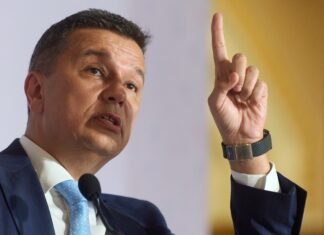Trump’s Perspective on the Ongoing Conflict: A Two-Month Reflection
On the 22nd of February, 2021, two months post-inauguration, former President Donald Trump shared his views on a significant international conflict, which he had previously vowed to resolve in a mere 24 hours. Reflection upon his earlier promises has sparked considerable discussion regarding the methods and strategies currently employed in American foreign policy.
In light of the ongoing war, Trump expressed his concern, articulating that the situation has escalated dangerously. He criticized the military operations carried out by Russian forces, stating, “They are bombing like crazy.” This statement underscores Trump’s belief that the aggression exhibited by Russia has not only intensified but is also indicative of a broader issue that transcends mere military might. Despite having assumed office with bold assertions about swiftly resolving conflicts—a promise that resonated with many of his supporters—Trump’s recent comments reveal a deep frustration with the expectations set forth regarding diplomatic negotiations and military strategies that would have ostensibly brought stability to the region.
One key element that has emerged from Trump’s reflections is his decision not to impose certain tariffs on Russia. This aspect of his foreign policy is noteworthy, as tariffs are often used as tools of economic pressure to influence a country’s military or political behavior. By refraining from such actions against Russia, Trump illustrates a complex approach to dealing with adversaries. His administration’s focus on avoiding trade penalties suggests a desire to maintain open lines of communication and potential negotiation, even amidst significant military conflict. Critics argue that this lack of sanctions sends mixed signals regarding America’s commitment to curtailing aggressive actions abroad.
Furthermore, Trump’s comments shed light on the potential ramifications of his administration’s foreign policy on domestic and international fronts. The American public, alongside ally nations, closely monitors these developments, as military engagements impact not only regional stability but also global security dynamics. Trump’s candid acknowledgment of the ongoing bombardments serves as a reminder that, irrespective of political allegiances, the repercussions of war extend beyond borders and affect countless lives.
The stark contrast between Trump’s initial promises of immediate resolution and the current state of warfare raises questions about the effectiveness and practicality of such ambitious proclamations. Critics have pointed out the inherent complexities in international relations and the diverse factors that contribute to conflict resolution, which often cannot be simplified to rapid solutions. The reality on the ground reflects a multitude of historical and geopolitical nuances, which necessitate careful consideration and strategic planning.
As Trump continues to express his thoughts on the situation, it becomes increasingly clear that the United States’ role in global conflicts is multifaceted. Moving forward, there will likely be ongoing discourse surrounding not just military engagement but also the broader impact of economic sanctions, diplomacy, and alliance-building within the context of international relations.
This evolving scenario underlines the importance of diligent engagement with foreign policy matters and highlights the intricate balance required to foster peace and stability on a global scale. As the situation continues to develop, it remains crucial to stay attuned to the implications of both military actions and diplomatic efforts in shaping the future of international relations.






